What the Arrest of a Prominent Jordanian Cartoonist Says About the State of Satire in the Arab World
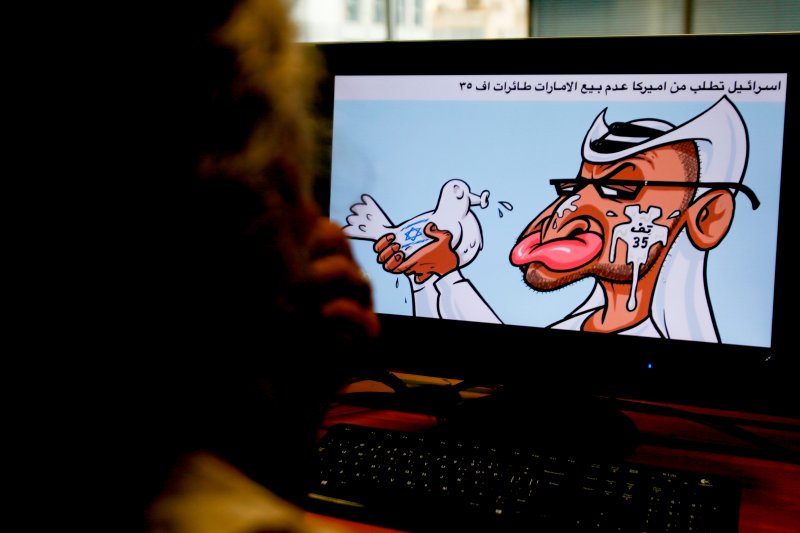
The course of renowned Jordanian cartoonist Emad Hajjaj’s decades-long career has not always run smoothly. Becoming the first local satirist to portray Jordan’s King Abdullah II in cartoon form in 2000 cost him his staff job at a government-owned newspaper. His persistent satirizing of Al Qaeda and ISIS brought death threats. And Amman’s general prosecutor collared him for questioning after a 2017 portrayal of Jesus Christ “disowning” the Greek Orthodox church offended some Jordanians.
Still, none of the pushback for Hajjaj’s lampooning of Israeli and Arab leaders, terrorists, or religious institutions prepared the 53-year-old for what happened on Aug. 26. So innocuous did Hajjaj consider the latest cartoon he’d filed to his editor—which mocked the recently-announced pact between Israel and the UAE to normalize relations—that when police in Jordan detained him at a checkpoint on his return from a picnic with his wife, he had no idea why he was being stopped. He ended up being arrested and imprisoned.
“I thought that I understood the game,” Hajjaj told TIME six days later, shortly after being released, noting that he had not named Crown Prince Mohammed bin Zayed, the Emirati monarch to whom the caricature appears to allude. “It was shocking, very confusing for my family. It was a difficult moment standing in line to enter the jail with criminals and drug dealers.”
What Hajjaj hadn’t understood was that the normalization deal was so sensitive a subject that satirizing it would bring counterterrorism charges connected to “harming Jordan’s relations with a friendly state.” Hajjaj’s arrest is more evidence of the deteriorating state of press freedom in Jordan, where police in July beat journalists covering a teachers’ protest. But it also illustrates the growing soft power of the UAE in the region. Jordan’s authorities would “rather abuse the rights of their own citizens than risk offending a Gulf leader’s feelings,” Human Rights Watch deputy Middle East director Joe Stork said in a statement calling for his release on Aug 28.
Activists and satirists on social media took note. German cartoonist and author Rainer Hachfeld penned an image of Jordan’s Prime Minister Omar Razzaz with his hands around Hajjaj’s throat. Another cartoonist, Ataq Shahid, drew a Jordanian-flagged boot stepping on the cartoonist’s hand. Amid the outcry, Jordan released Hajjaj on Aug 30—a move so abrupt it surprised his lawyer. He remains under investigation and could still face up to three years in prison under the country’s cybercrime laws, according to his lawyer.
The offending image depicts an Israeli flag-daubed dove spitting at the face of a man in an Emirati Ghutra many believe represents the UAE’s de-facto leader, bin Zayed. A splatter on his cheek forms the shape of a fighter jet with Arabic letters inside spelling out F-35—a reference to the military hardware Israel has lobbied the U.S. against selling to the UAE.
Israel and the UAE’s Aug. 13 announcement that they would normalize relations sent shockwaves through the Middle East. Of the Arab League’s 22 member states only Egypt and Jordan have peace treaties in place with Israel. As recently as June, Jordan was reportedly reviewing its 26-year-old accord over the prospect of Israel’s annexation of Palestinian territory. The Palestinian leadership has called the UAE’s actions a “stab in the back,” describing the halt it places on annexation as a “fig leaf.”
Yet the closest thing to pushback from within the UAE, says Kristian Ulrichsen, a political scientist who specializes in Gulf politics, has been several high profile public intellectuals “indicating their reservations obliquely and indirectly.” That’s not surprising in one of the world’s most surveilled states, which rights advocates criticize for its “unrelenting repression” of dissent. Similarly, Jordanians on the street are wary of expressing an opinion “precisely because of the understanding that the security relationship between Jordan and the UAE is a close one,” says Ulrichsen, “a position which the arrest of Hajjaj merely underlined.”
Jordan has long paid deference to its Gulf neighbors. A former newspaper editor in Amman, who declined to give his name in order to speak freely, tells TIME that when he worked at the state-run media outlet the government would routinely discourage negative reporting or criticism of Gulf leaders that might impact relations with Gulf states. The editor says he knows of no evidence the UAE intervened to force Hajjaj’s arrest, “But my guess is that they did interfere. Jordan is very vulnerable on jobs and finances.”
In Egypt, the media response to the pact has been similarly muted. A number of political newspaper cartoons have expressed outrage, but none mention the UAE by name, according to Jonathan Guyer, a journalist and academic who studied Egypt’s political cartoons during the 2011 Revolution. “This is an incredibly unpopular accord, but it appears Arab leaders have clamped down on dissent against it,” Guyer says, “That’s why Emad Hajjaj’s caricature was so outrageous.”
Hejjaj says he is not against the UAE or peace with Israel. In fact, his cartoons have twice been honored at the Dubai Press Club’s Arab Journalism Awards. But as a satirist, it is his job to comment on controversial topics. “I really love the Emirates. I’ve been there many times,” he says. “But … why do they have a big problem with cartoons?”
Cartooning and other forms of satire boomed during the youth-led uprisings of 2010 and 2011 sometimes described as the Arab Spring. But as those revolutions were co-opted by extremists, or brutally repressed by other anti-democratic forces, the space for free expression began to shrink. Now, says Hajjaj, it is narrower than ever. “U.S. allies like Egypt, Saudi Arabia, and the UAE have managed to persuade the Americans that democracy is no good for us, and they should be able to do whatever they want,” he says. Faced with such abject politics, “the least we can do is make jokes about our reality. They should allow us that.”
When his art has got him into trouble before, he has bounced back. After Hajjaj portrayed the Jordanian King in cartoon form two decades ago, he was fired from his job at government-owned daily Al Rai. Crushed and afraid, he took a job at a smaller newspaper and for a while became “an ordinary cartoonist, drawing cartoons that would make nobody upset.” But within a year Hajjaj returned to tackling controversial topics. In the wake of the worst terrorist attack in Jordan’s history—a series of bomb attacks on three Aman hotel lobbies that killed scores of people in 2005—he drew a cartoon of three interlocking hands on a black background. One red, one green, one white; the clasped palms in Jordan’s national colors became a symbol of solidarity, reprinted on t-shirts, pens, and banners.
Whether his arrest will change the way he responds to future events in the Arab World, Hajjaj says, it’s too early to say. Upon his release last week, his lawyer advised him to keep a low profile. Instead, he turned in his customary weekly assignment—though it took a little longer than usual to decide on a subject. Hajjaj’s drawing depicted an artist hunched over his desk. A welder’s mask shields his face from flying sparks as his pen hits the page.
Latest News
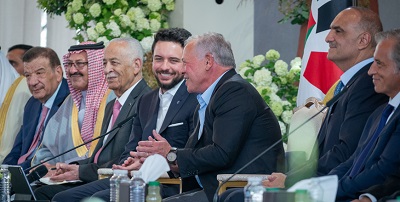 King from Mafraq: Jordan’s security, sovereignty above all considerations
King from Mafraq: Jordan’s security, sovereignty above all considerations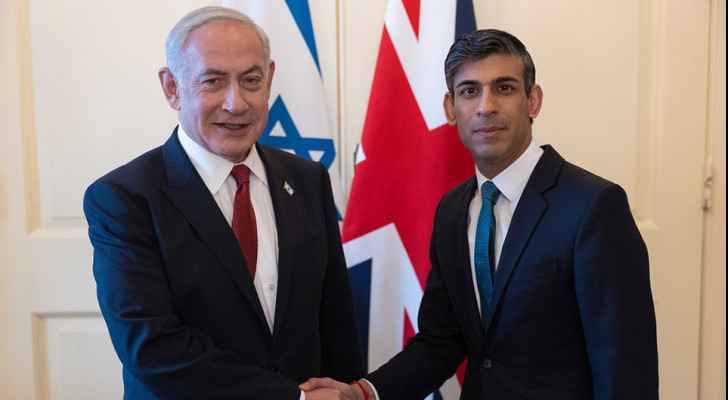 Sunak tells Netanyahu to “allow calm heads to prevail”
Sunak tells Netanyahu to “allow calm heads to prevail”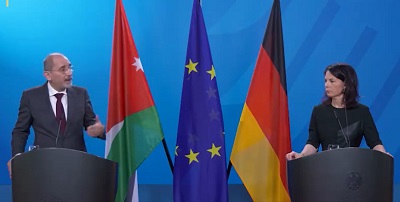 Safadi, Germany’s Baerbock discuss war on Gaza, regional escalation
Safadi, Germany’s Baerbock discuss war on Gaza, regional escalation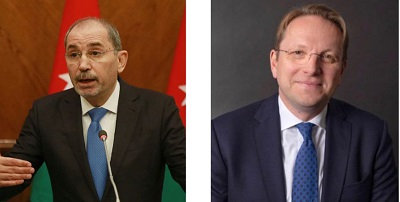 FM, EU commissioner discuss development cooperation, regional de-escalation
FM, EU commissioner discuss development cooperation, regional de-escalation Jon Stewart unpacks Iran launching missiles at Israel
Jon Stewart unpacks Iran launching missiles at Israel
Most Read Articles
- Senate president, Iraqi president discuss bilateral ties, regional issues
- King from Mafraq: Jordan’s security, sovereignty above all considerations
- Sunak tells Netanyahu to “allow calm heads to prevail”
- JHCO dispatches 75-truck convoy of food aid to Gaza
- UN agency finds unexploded 1,000-pound bombs in Gaza schools
- Sudanese rue shattered dreams as war enters second year
- Making emerging technologies safe for democracy - By Marietje Schaake and Steven Schuurman, The Jordan Times
- Massive fire engulfs Copenhagen’s historic stock exchange
- IMF ups global growth forecast but signals medium-term pessimism
- When Namibia stands up to Germany: How Gaza revolutionised the Global South - By Ramzy Baroud, The Jordan Times